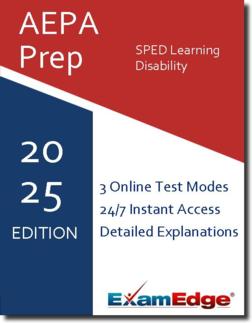AEPA Special Education Learning Disability (27) Practice Tests & Test Prep by Exam Edge - Topics
Based on 25 Reviews
- Real Exam Simulation: Timed questions and matching content build comfort for your AEPA SPED Learning Disability test day.
- Instant, 24/7 Access: Web-based AEPA Special Education Learning Disability practice exams with no software needed.
- Clear Explanations: Step-by-step answers and explanations for your AEPA exam to strengthen understanding.
- Boosted Confidence: Reduces anxiety and improves test-taking skills to ace your AEPA Special Education Learning Disability (27).

Understanding the exact breakdown of the AEPA Special Education Learning Disability test will help you know what to expect and how to most effectively prepare. The AEPA Special Education Learning Disability has multiple-choice questions The exam will be broken down into the sections below:
| AEPA Special Education Learning Disability Exam Blueprint | ||
|---|---|---|
| Domain Name | % | Number of Questions |
| Understanding Students with Specific Learning Disabilities | 19% | 19 |
| Assessing Students and Developing Individualized Education Programs (IEPs) |
19% | 19 |
| Promoting Student Development and Learning | 48% | 47 |
| Working in a Collaborative Learning Community | 16% | 16 |


